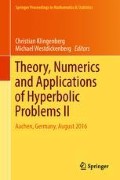Abstract
Exponential integrators are becoming increasingly popular for stiff problems of high dimension due to their attractive property of solving the linear part of the system exactly and hence being A-stable. In practice, however, exponential integrators are implemented using approximation techniques to matrix-vector products involving functions of the matrix exponential (the so-called \(\varphi \)-functions) to make them efficient and competitive to other state-of-the-art schemes. We will examine linear stability and provide a Courant–Friedrichs–Lewy (CFL) condition of special classes of exponential integrator schemes called EPIRK and sEPIRK and demonstrate their dependence on the parameters of the embedded approximation technique. Furthermore, a conservation property of the EPIRK schemes is proven.
Access this chapter
Tax calculation will be finalised at checkout
Purchases are for personal use only
References
A. Kanevsky, M.H. Carpenter, D. Gottlieb, J.S. Hesthaven, Application of implicit-explicit high order Runge-Kutta methods to discontinuous-Galerkin schemes. J. Comput. Phys. 225, 1753–1781 (2007)
J. Loffeld, M. Tokman, Comparative performance of exponential, implicit, and explicit integrators for stiff systems of ODEs. J. Comput. Appl. Math. 241(1), 45–67 (2013)
J. Niesen, W.M. Wright, Algorithm 919: a Krylov subspace algorithm for evaluating the phi-functions appearing in exponential integrators. ACM TOMS 38(3), 1–19 (2012)
G. Rainwater, M. Tokman, A new class of split exponential propagation iterative methods of Runge-Kutta type (sEPIRK) for semilinear systems of ODEs. J. Comput. Phys. 269, 40–60 (2014)
V. Straub, S. Ortleb, P. Birken, A. Meister, Efficient time integration of IMEX type using exponential integrators for compressible, viscous flow simulation. PAMM 16, 867–868 (2016)
M. Tokman, A new class of exponential propagation iterative methods of Runge-Kutta type (EPIRK). J. Comput. Phys. 230, 8762–8778 (2011)
Acknowledgements
We thank the German Research Foundation DFG for its financial support within the project GZ: ME 1889/7-1.
Author information
Authors and Affiliations
Corresponding author
Editor information
Editors and Affiliations
Rights and permissions
Copyright information
© 2018 Springer International Publishing AG, part of Springer Nature
About this paper
Cite this paper
Birken, P., Meister, A., Ortleb, S., Straub, V. (2018). On Stability and Conservation Properties of (s)EPIRK Integrators in the Context of Discretized PDEs. In: Klingenberg, C., Westdickenberg, M. (eds) Theory, Numerics and Applications of Hyperbolic Problems II. HYP 2016. Springer Proceedings in Mathematics & Statistics, vol 237. Springer, Cham. https://doi.org/10.1007/978-3-319-91548-7_46
Download citation
DOI: https://doi.org/10.1007/978-3-319-91548-7_46
Published:
Publisher Name: Springer, Cham
Print ISBN: 978-3-319-91547-0
Online ISBN: 978-3-319-91548-7
eBook Packages: Mathematics and StatisticsMathematics and Statistics (R0)

